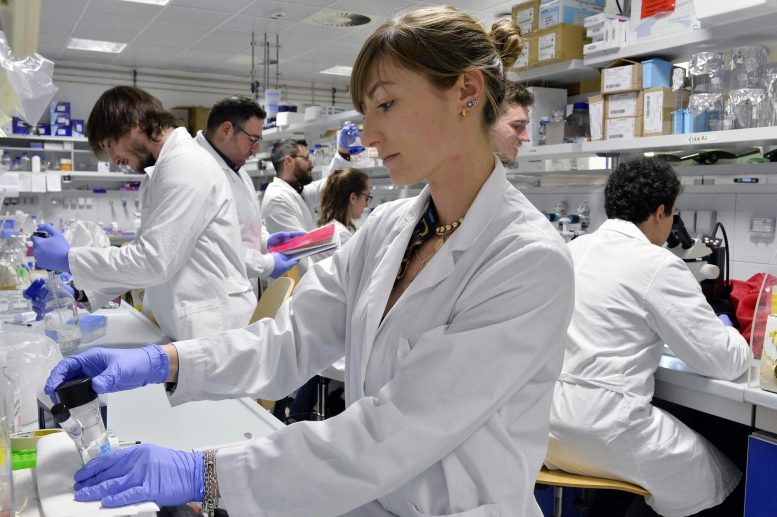
The research team coordinated by Luca Tiberi of the Armenise-Harvard Laboratory of Brain Disorders and Cancer of Cibio Department of the University of Trento developed a new strategy to study brain tumors of childhood. Credit: ©AlessioCoser for University of Trento
Organoids (In Vitro Brains) to Study Pediatric Brain Tumors
A large-scale production of in vitro tumors could make it possible to perform large drug screenings to identify new brain cancer drugs.
Researchers are at work to find effective treatments to help young patients with brain tumors. Hundreds of brain organoids have been developed in the laboratories of the University of Trento to understand the genetic mechanisms responsible for these hard to treat diseases.
In this way, the research team coordinated by Luca Tiberi of the Armenise-Harvard Laboratory of Brain Disorders and Cancer of Cibio Department of the University of Trento developed a new strategy to study brain tumors of childhood.
The University of Trento led the research study, coordinating a research team involving Sapienza University of Rome, Ospedale pediatrico Bambino Gesù in Rome, and Irccs Neuromed-Istituto neurologico mediterraneo in Pozzilli (Isernia), with support from the Armenise-Harvard Foundation, the Italian Association for Cancer Research-Airc, and Fondazione Caritro in Trento.
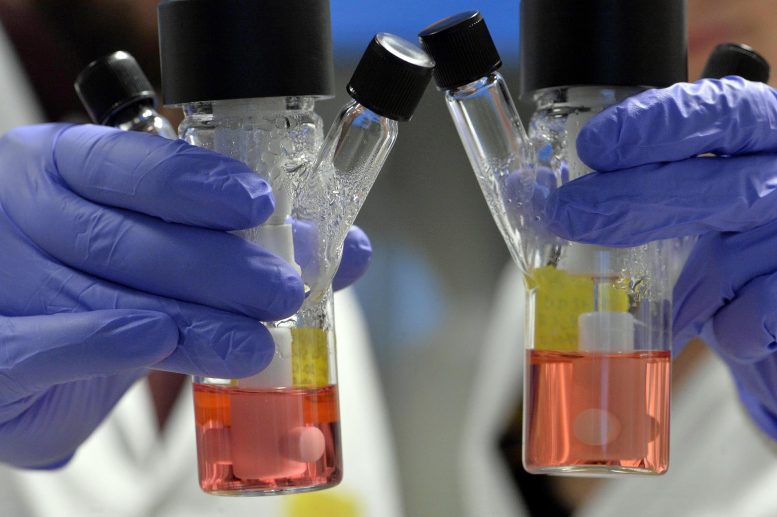
Hundreds of Organoids (miniature brains) were grown in the laboratories of the University of Trento to study the genetic mechanisms responsible for the most common brain cancer affecting children. Credit: ©AlessioCoser for University of Trento
The organoids were used to create in vitro tumor models. The results achieved will make it possible to advance brain cancer research, as in the near future the large-scale production of in vitro tumors could provide a low-cost method for the screening of new drugs compared with previous technologies.
“Creating brain tumor organoids is very difficult — underlined Tiberi, the research team coordinator — and requires specific scientific capabilities that Cibio department managed to attract and develop in its research laboratories.”
“Organoids, generated from skin or blood cells, shaped like irregular spheres the size of a small peanut, were grown by the University of Trento and examined and characterized with Sapienza University of Rome and Ospedale pediatrico Bambino Gesù in Rome. They can show signs of disease and provide a model of the tumors affecting young patients — he added. This work demonstrates how important it is to collaborate for universities and research institutes to initiate innovative projects.”
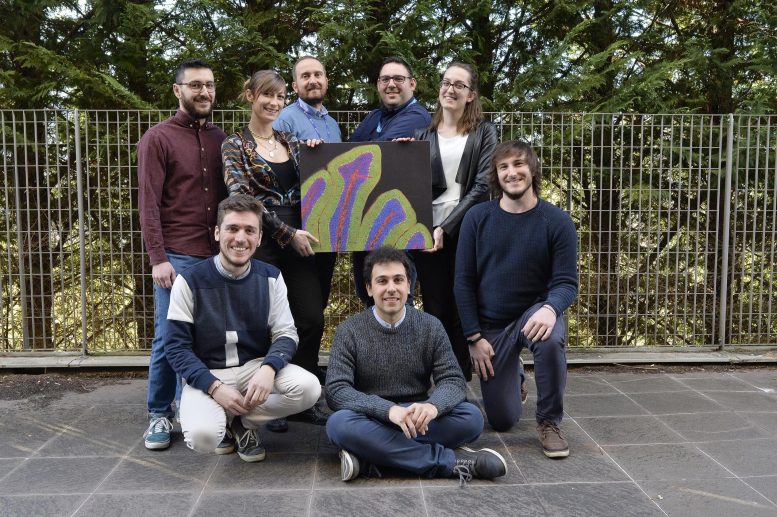
The research team coordinated by Luca Tiberi of the Armenise-Harvard Laboratory of Brain Disorders and Cancer of Cibio Department of the University of Trento developed a new strategy to study brain tumors of childhood. Credit: ©AlessioCoser for University of Trento
“We also have grown organoids from the cells of healthy donors — explained Tiberi — and these gave us the opportunity to understand some of the genetic mechanisms responsible for the onset and development of brain tumors. In particular, the study confirmed the key role of two proteins (Otx2 and c-Myc) and investigated the efficacy of a number of therapeutic options (based on the drug Tazemetostat).”
Tiberi continued: “These in vitro tumors will help us fine-tune research on the genes that cause cancer and on possible prevention and treatment strategies. Organoids give us the opportunity to study brain tumors without using experimental animals in a context that is similar to a real-patient scenario. They can be a reliable tool for developing personalized therapies.”
Brain tumors in childhood
Brain tumors are the first cause of death due to cancer in children. They are very aggressive and require a multidisciplinary and integrated approach. While significant progress has been made in treating these tumors, surviving patients may suffer long-term side effects that significantly compromise their quality of life. When the tumor reappears after some time, therapies are usually ineffective. Medulloblastoma, the focus of this study, is the most common malignant brain tumor in children affecting the central nervous system. The survival rate at five years from the diagnosis of medulloblastoma is around 70% (source: AIRC Italian Association for Cancer Research).
About the article
“Modeling Medulloblastoma in-vivo and with human cerebellar organoids” was published in Nature Communications today, January 29, 2020.
The authors of the article are:
Claudio Ballabio, Marica Anderle, Matteo Gianesello, Chiara Lago, Giuseppe Aiello, Marina Cardano, Silvano Piazza, Davide Caron and Luca Tiberi of the University of Trento (Armenise-Harvard Laboratory of Brain Disorders and Cancer, Cibio Department);
Evelina Miele, Lucia Pedace, Angela Mastronuzzi, Andrea Ciolfi and Marco Tartaglia of Bambino Gesù Children’s Hospital, Rome;
Franco Locatelli of the Department of Pediatric Hematology/Oncology of Bambino Gesù Children’s Hospital, Rome, and of the Department of Pediatrics of Sapienza University, Rome;
Elisabetta Ferretti of the Department of Experimental Medicine of Sapienza University, Rome; Felice Giangaspero and Francesca Gianno of the Department of Radiologic, Oncologic and Anatomo Pathological Sciences of Sapienza University, Rome, and IRCCS Neuromed.
Reference: “Modeling medulloblastoma in vivo and with human cerebellar organoids” by Claudio Ballabio, Marica Anderle, Matteo Gianesello, Chiara Lago, Evelina Miele, Marina Cardano, Giuseppe Aiello, Silvano Piazza, Davide Caron, Francesca Gianno, Andrea Ciolfi, Lucia Pedace, Angela Mastronuzzi, Marco Tartaglia, Franco Locatelli, Elisabetta Ferretti, Felice Giangaspero and Luca Tiberi, 29 January 2020, Nature Communications.
DOI: 10.1038/s41467-019-13989-3

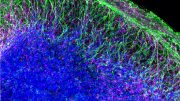
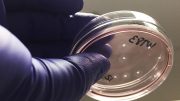
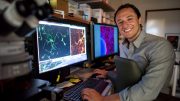



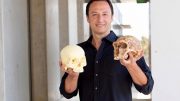
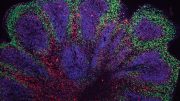
Be the first to comment on "Hundreds of In Vitro Brains Were Grown in a Lab in Italy – Here’s Why"